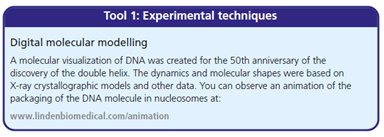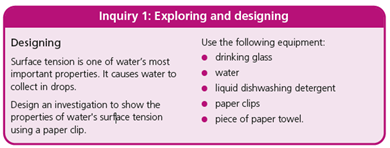

BLOGS > FEBRUARY 13, 2024
BY ANDREW DAVIS

‘I hear and I forget. I see and I remember. I do and I understand.’
Attributed to Xunzi (Confucian philosopher, ca. 320–235 BCE)
Inquiry-based learning is central to the experimental sciences and should be at the heart of all school-based curricula. Some parts of the biology syllabus are easier to deliver with this “hand on” approach than others, such as osmosis and enzyme theory. Other topics are more problematic. We have all faced the situation of thinking “How am I going to teach this?” without reverting to “chalk-and-talk” (or its modern version, whiteboard and marker pen) which inevitably fails to deliver a deep-seated understanding of the subject. For example, without practical experiences, cell ultrastructure can be an unexciting and superficial experience for students. Active learning is still possible in these situations, however. As most schools do not have ready access to an electron microscope, creative ways must be found for students to explore and make their own understandings of this topic. Take, for example, the plasma membrane. An activity where students cut out components of a cell membrane drawn onto an A4 sheet, with only brief details provided for each (e.g., phospholipids are amphipathic), and then construct a model based on this information, can provide an effective way for students to understand and remember this key component of cell structure. By using creative and thinking skills, students can develop their own answers to biological questions, even when there is no access to technology which is beyond the scope of school laboratories.
Skills-based learning is at the heart of the new biology syllabus, and by learning through action, students are more likely to develop and retain an understanding of how these skills can be realised. As a result, they are more able to apply their knowledge in novel situations.
The skills that students are expected to experience through the course are encompassed within the tools and inquiry process:
Tools
Inquiry process
An overview of these skills can be found in the Tools and Inquiry section of the 2023 IB Biology Guide (pages 28-33). Guidance on how the tools can be applied in the learning and teaching of the subject can be found as ”Application of skills” in many content statements. These skills provide the foundation for practical work and internal assessment while supporting the application and development of the inquiry process in the delivery of the new course.
All tools are covered in Biology for the IB Diploma (third edition), and are linked to relevant content statements. This allows these skills to be learnt in context. For example, on page 28, one aspect of Tool 1 is explored in relation to nucleosome structure:

The application and development of the Inquiry process is supported throughout Biology for the IB Diploma (third edition), in close association with the Tools. The new ‘Inquiry’ feature supports the inquiry process, which focuses on aspects of the inquiry cycle. There are three Inquiry boxes: Inquiring and designing, Collecting and processing data, Concluding and evaluating.
For example, on page 7, there is an inquiry activity that allows students to explore the properties of water:

These Inquiry boxes create opportunities for students to design investigations, collect data, develop manipulative skills, analyse results, collaborate with peers and evaluate and communicate their findings. This inquiry allows students to develop skills they will need for their Scientific Investigation (SI) – the Internal Assessment.
In addition to the Tool and Inquiry features, ATL activity boxes are included throughout the book. Approaches to learning (ATL), including learning through inquiry, are integral to IB pedagogy. The ATL provide the framework for the development of the Tools and Inquiry skills. These activities are designed to get students to think about real-world applications of biology. For example, on page 371 there is an activity that explores the relationship between dentition and diet:

A combination of Tools, Inquiry, and ATL activities, ensures that students encounter and can practise skills throughout Biology for the IB Diploma (third edition).
This blog by Christopher Talbot shows how the topic Water (A1.1) can be taught using an inquiry-based approach.
For more information, visit titlewave.com.
About the Author:

Andrew Davis is co-author of Biology for the IB Diploma (third edition). He has taught biology for over 20 years and is author of a variety of resources for MYP and DP, including Biology for the IB Diploma Study and Revision Guide, IB Diploma: Internal assessment for Biology: Skills for success, and Biology for the MYP 4 & 5: By Concept. He is also author of online teaching and learning resources: Biology for the IB Diploma Teaching and Learning and Biology for the IB MYP 4 & 5 Dynamic Learning.
2026 ALA Youth Media Award Winners: Find the Best Children's & YA Books of the Year
January 26, 2026
On their 150th anniversary, the American Library Association (ALA) revealed the ALA YMA 2026 winners and honorees on January 26, 2026, honoring the year’s most exceptional books and media for children and teens. Recognized globally for their impact and excellence, the...
Read more
An Author Interview with Jennie Wood
January 9, 2026
From non-binary author Jennie Wood, creator of the acclaimed graphic novel series Flutter, comes I Didn't Ask For This, which follows a group of kids who share one thing in common: their parents are social media influencers who’ve shared their...
Read more
An Author Interview with Don Everts
December 17, 2025
What peculiar thread connects secret superpowers, chicken farming, Victorian architecture, and the impossible awkwardness of being 14? Debut middle grade author Don Everts weaves it together for us in this conversation about his new book, Oscar and the Mystery of...
Read more
An Author Interview with Sara Amini and Illustrator Shadia Amin
December 17, 2025
Author Sara Amini and artist Shadia Amin team up for this charming, semi-autobiographical middle grade graphic memoir that explores evolving friendships, puberty mishaps, and finding a place to belong. Navigating life as a multiracial girl has never been more hilarious...
Read more
An Author Interview with Katherine Applegate
December 17, 2025
Go behind the scenes with Newbery Medal-winning author and literary superstar Katherine Applegate as she discusses her returns with two exciting new titles releasing in spring! First up is The Littlest Elephant, a picture book adaptation of the best-selling middle grade...
Read more
An Author Interview with Amy Timberlake and Illustrator Jon Klassen
December 17, 2025
Award-winning author Amy Timberlake and illustrator Jon Klassen team up to bring you the latest in the Skunk and Badger trilogy. Rock Paper Incisors follows odd-couple roommates Skunk and Badger as they explore the complexity of friendship and the meaning...
Read more